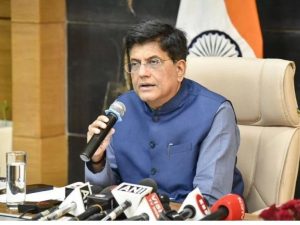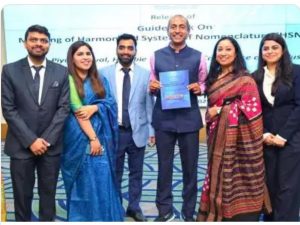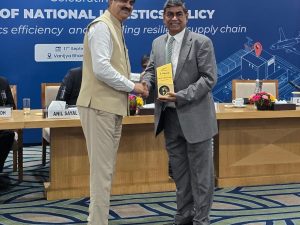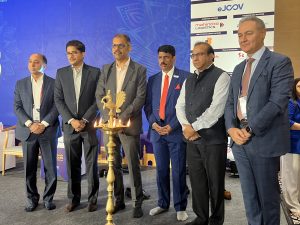Union Commerce and Industry Minister Piyush Goyal launched six new initiatives in New Delhi, including the upgraded Logistics Data Bank (LDB) 2.0 and Industrial Park Rating System (IPRS) 3.0.Goyal said LDB 2.0 will offer real-time insights into the availability of facilities, infrastructure across India’s logistics ecosystem, enabling better planning, improved efficiency, and reduced costs. Developed by NICDC Logistics Data Services (NLDSL), the platform features enhanced export container tracking on the high seas, multimodal shipment visibility, and integration with the Unified Logistics Interface Platform. It provides a live heat map of container distribution across India, helping industry and policymakers anticipate, and resolve potential bottlenecks. The initiatives were launched marking a decade of the ‘Make in India’ initiative.
Read More »DPIIT signs agreement to empower women in logistics
Startup India, an initiative of the Department for Promotion of Industry and Internal Trade (DPIIT), has signed an agreement with Womennovator (Global Incubator for Women), run by Gvriksh Foundation, to empower women entrepreneurs and startups across 100 districts in India. The pact aims to strengthen the ecosystem for women-led startups, creating a nationwide impact through structured mentorship, investor access, skill development, and gender-inclusive innovation challenges.
Read More »ACAAI holds meet to discuss trade initiatives
The Air Cargo Agents Association of India (ACAAI), Western Region, Mumbai, hosted an insightful evening featuring two highly engaging sessions for the trade fraternity. The first session —Family Business Journey — was presented by Sandesh Mestry, Family Business Advisor. Illustration the balance of creation, preservation, and transformation in family-managed businesses across generations, he drew inspiration from Brahma the Creator, Vishnu the Preserver, and Mahesh the Transformer. The second session — NMIA Cargo Facility Overview — was presented by Suresh Nair, Head Cargo, NMIA. NMIA also gave first-hand updates and a presentation on the upcoming Navi Mumbai International Airport cargo facility. The evening was marked by learning, networking, and camaraderie among industry stakeholders. Following the sessions, members connected and exchangedideas over refreshments, drinks, and dinner, adding to the spirit of fellowship and collaboration.
Read More »‘ Border closures and delays have impacted the flow of fuel, medicines & perishables
Kamal Jain, Director, Cargomen Logistics said, “The ongoing political unrest in Nepal has disrupted cross-border trade with India, stranding hundreds of trucks and causing shortages of essential commodities. Border closures and delays have impacted the flow of fuel, medicines, food staples and perishables, leading to price spikes and spoilage losses. Transporters and traders in Indian border states are facing daily losses running into crores as goods remain stuck at key checkpoints like Rupaidiha and Sonauli. While partial reopening of borders has eased the supply of essentials, uncertainty continues. The disruptions highlight the vulnerability of India-Nepal trade to political instability and the urgent need for resilience measures.”
Read More »‘Nepal relies heavily on India for critical supplies like petroleum, food grains, cement’
Dipen Lalsodagar, Deputy Director – Sales, Global Aviation Services said, “The recent disruptions in Nepal have severely impacted its supply chain. With airports closed and borders sealed, the country faced acute shortages of essential goods. Nepal relies heavily on India for critical supplies such as petroleum, food grains and cement. Although air and road connectivity has now resumed in a phased manner, it is expected to take several months before normalcy is fully restored.”
Read More »‘The challenge is to build sustainable economic relationship with Nepal’
Sunil Kohli, Managing Director, Rahat Cargo said, “Nepal’s just concluded violent Gen-Z protests, have already disrupted to a considerable extent, the business operations, border activities and governance. For India, which is Nepal’s largest trading, investment and development partner, it underscores a recurring risk that must be factored into trade strategy. Primarily, the sheer structural dependence of Nepal on Indian imports, ranging from petroleum to cereals, poses vulnerabilities. India’s exports to Nepal in 2024 were valued at USD 6.95 Billion, led by mineral fuels, iron, steel, machinery, vehicles, electronics, cereals, plastics and pharmaceuticals. Therefore, any disruption in such export activities is bound to affect the Indian’s exporters economically. Further, for smaller Nepali exporters in agriculture, handicrafts and textiles, the business-related frictions make accessing Indian markets prohibitively difficult. Fortunately, consequent upon the normalcy having returned to Nepal with an interim PM in place, the challenge for our government is not just about fixing numbers, but about building a sustainable economic relationship with Nepal’s while reinforcing India’s leadership in the region.”
Read More »‘Losses crossed crores a day, onions, soyabean meal, dairy worst hit’
Balagopal Balachandran, National Air Freight Head, FEI Cargo said, “The unrest in Nepal is not just a political story, it’s playing out the lives of farmers, truckers and traders on both sides of the border. Bilateral trade between the two nations reached approximate US$8.54 billion in FY 2024-25. India exported goods worth US$7.3 billion to Nepal, while Nepal shipped about US$1.2 billion into India, mostly soyabean oil, polyester yarn, cardamom, jute products and carpets. When borders stall, both flows take a hit. At Rupaidiha in Uttar Pradesh and Sunauli in Bihar, more than 1,000 trucks stood idle for days. “We watched our vegetables rot in front of us,” said an Indian trader, forced to sell produce locally at throwaway prices. Losses crossed crores a day, with onions, soyabean meal and dairy among the worst hit. For Nepal, dependent on India for fuel, Spare parts, medicines and construction materials, the blockade meant shortages and rising costs. Nepal’s exporters too felt the squeeze. Soyabean oil and cardamom shipments bound for India were stuck in transit, hitting small producers and cooperatives hard. Carpet exporters in Kathmandu feared losing international buyers who rely on timely deliveries through India’s ports. Looking ahead, resilience is key. Now, as normalcy resumes slowly so are the supplies, stakeholders are urging long term fixes: faster border clearances, cold chain support for perishables and digital customs integration. For millions tied to this trade, one truth is clear: India–Nepal connectivity is more than commerce. Nepal needs Indian corridors and India’s border states rely on Nepal’s markets.
Read More »ACAAI joins DPIIT’s event to celebrate NLP
CK Govil, President, ACAAI joined an esteemed panel at Vanijya Bhawan during Department for Promotion of Industry and Internal Trade (DPIIT)’s event commemorating three successful years of the National Logistics Policy (NLP). During the discussion, he shared valuable insights on how collaborative efforts, policy support, and innovation are collectively propelling India’s logistics ecosystem towards enhanced efficiency, resilience, and sustainable growth.
Read More »Partnerships forged to advance cold chain ecosystem
The ongoing Cold Chain Unbroken (CCUB) event marked a milestone following signing of a deal between Cold Chain Unbroken Services and Pharmacom Italy, while another was signed with NAB-CCM. These partnerships are aimed at driving innovation, enhancing infra, and elevating service standards across the cold chain industry. Through these alliances, the organisations will work together to deploy advanced cold chain technologies, streamline logistics solutions, and support knowledge exchange across global markets. The collaborations underscore a commitment to build a resilient, efficient and sustainable cold chain ecosystem, critical for sectors such as pharma, healthcare, and food logistics.
Read More »CCUB 2025 starts in Hyd, focus on tech, innovation
The Cold Chain Unbroken event began in Hyderabad, drawing air cargo & logistics and pharma leaders from across the globe. The event served as a platform to showcase the latest innovations, address pain points, and explore the future of cold chain technology. Key deals were signed during the event, paving the way for collaborations and tech advancements. Nikhil Chakravarthy J, Commissioner, Director, Industries, Govt of Telangana, was the Chief Guest and Pradeep Panicker, CEO, GMR Hyderabad International Airport was the Guest of Honour. The latter highlighted the sector’s role in ensuring food and pharma safety. The following sessions in the event engaged in dialogue around strengthening temperature-controlled supply chains. An industry report was also launched, which offered an in-depth insight into trends, innovations and investment opportunities in the global cold chain ecosystem.
Read More » Cargo Breaking News
Cargo Breaking News









